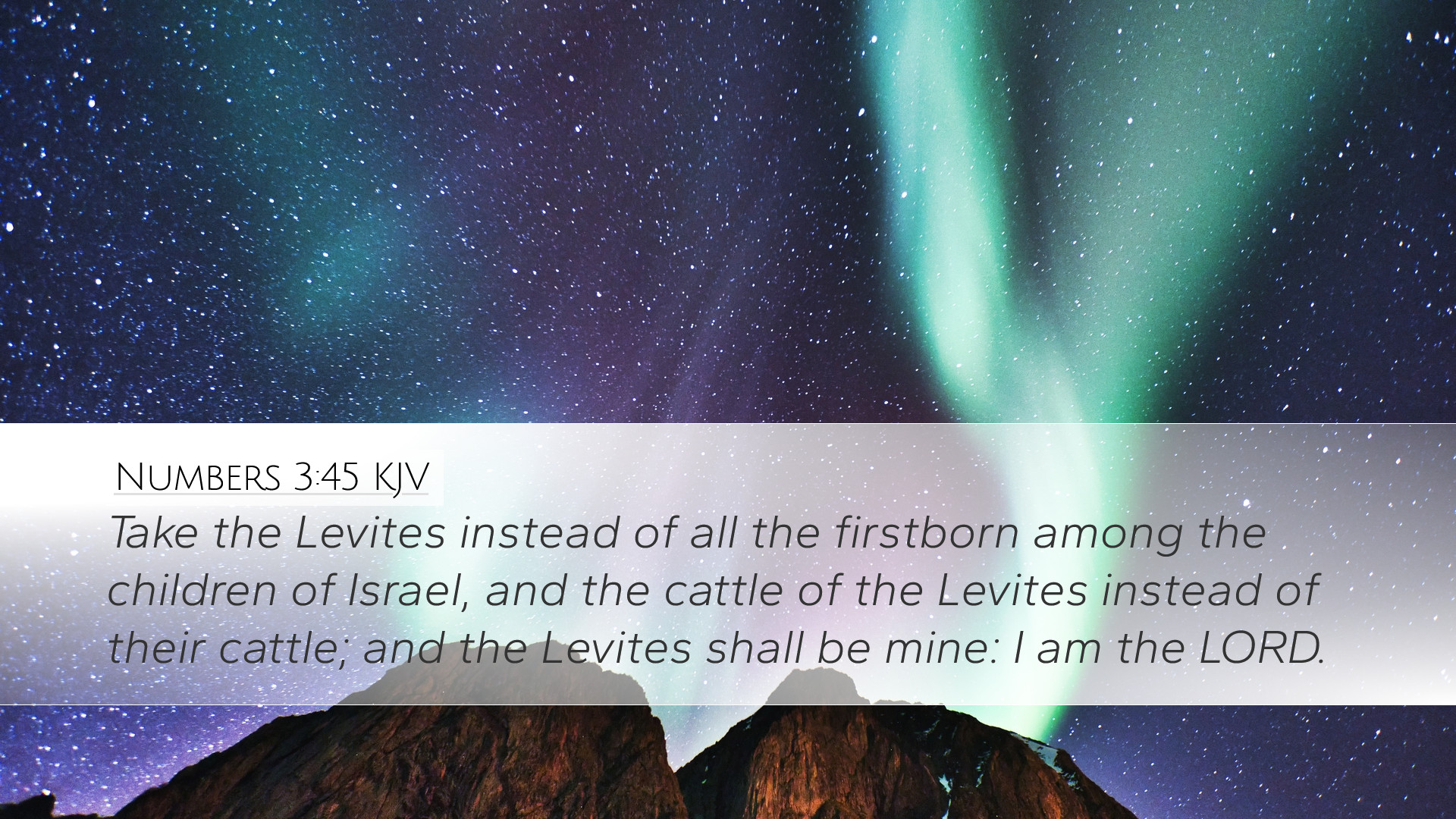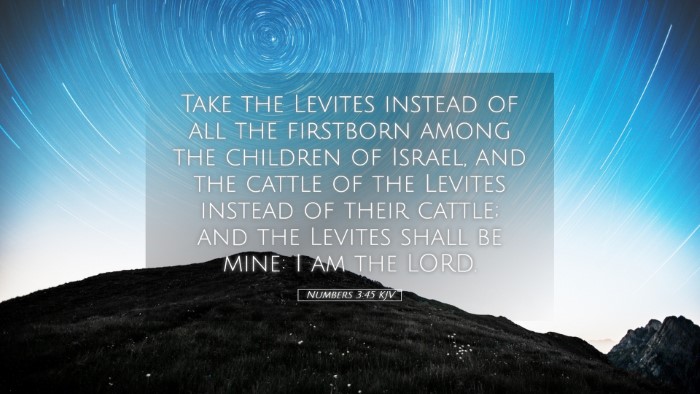Commentary on Numbers 3:45
Text of Numbers 3:45 (KJV): "Take the Levites for all the firstborn of the children of Israel; and the cattle of the Levites for their cattle: and the Levites shall be mine: I am the LORD."
Introduction
Numbers 3:45 presents a pivotal moment in the establishment of the Levitical priesthood and the divine allocation of roles among the tribes of Israel. In this verse, God directs the substitution of the Levites for the firstborn sons of Israel, indicating a special purpose for the Levites in sacred service. The significance of this commandment has been examined through various theological lenses, providing insight into the nature of God’s covenant with Israel and the sanctification of the Levites.
Theological Significance
This directive underscores the importance of divine choice and the sanctity of the priesthood. The Levites, deemed God's possession, serve a unique role in mediating between God and His people, thus emphasizing the sacred relationship between God and Israel.
Matthew Henry's Perspective
Matthew Henry highlights the idea of substitution inherent in this directive. According to him, the firstborns of Israel represent familial leadership, but God designates the Levites to take their place exclusively for His service. Henry notes that the Levites are seen as redeemed from among the congregation, signifying their special status that fulfills God's purposes.
Henry elaborates on how this exchange demonstrates God’s sovereignty—He has the right to claim any portion of His creation, particularly those dedicated to sacred duties. He elucidates that the Levites symbolize the spiritual service owed to God and the necessity of having a designated group of individuals to perform holy tasks.
Albert Barnes' Commentary
Barnes emphasizes that this substitution serves as a fulfillment of God’s earlier redemptive acts, particularly during the Exodus. He articulates that the firstborn sons of Israel were initially spared during the last plague, thus they had a special claim to God's protection and service. However, in grace, God turns their duty over to the Levites, who are purely set apart for the ministry.
Barnes also points out that the Levites were not merely placeholders; rather, they were an essential part of God’s plan for worship and sacrifices within the community. He stresses that this transition highlights God's ongoing commitment to order and holiness, and the necessity of mediatory roles in approaching the divine.
Adam Clarke's Insights
Clarke provides a detailed examination of the verse, noting the significance of the Levites’ role in relation to the broader worship system established among the Israelites. He suggests that the Levites being "mine" signifies a divine ownership, calling them into a unique covenant relationship with God.
Furthermore, Clarke discusses the implications of this exchange for the understanding of redemption and sacrificial systems within Israel. He argues that the process illustrates both God's justice and mercy, balancing the need for sin offerings while also authorizing a tribe to bear the weight of priesthood.
The Role of the Levites
The instruction to appoint the Levites in place of the firstborn underscores their centrality in the Israelite community. They were designated to carry out sacred duties: guarding the tabernacle, performing sacrifices, and leading worship. This highlights several important themes:
- Servanthood: The Levites were chosen not for privilege but for service, reflecting the heart of true leadership in God’s kingdom.
- Holiness: Their role emphasizes the call for holiness—a foundational principle throughout biblical texts. The Levites represent those who have been set apart to serve in a manner that reflects God's character.
- Redemption: The symbolic act of redeeming the firstborn through the Levites foreshadows the greater redemption through Christ, where believers are considered a ‘royal priesthood’ (1 Peter 2:9).
Conclusion
In conclusion, Numbers 3:45 encapsulates a significant theological principle regarding divine selection, service, and sanctification. The choice of the Levites signifies God’s desire for a community dedicated to His worship, reflecting His holiness and justice. The role of the Levites serves as a precursor to the understanding of priesthood fulfilled in Christ, who ultimately redeems and calls believers into a relationship where they too serve as conduits of grace and truth.
This verse invites pastors, scholars, and theologians alike to reflect on the nature of their own service within the church and the broader implications of being chosen by God for His purposes. Ultimately, it serves as a reminder of the sacred responsibility that comes with divine call, urging a deeper commitment to holiness and faithfulness in ministry.


